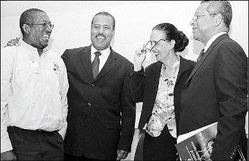UWI notebook - Department of Government holds graduate student conference
Published: Sunday | July 12, 2009

Contributed
Minister of Foreign Affairs and Foreign Trade, Dr Ken Baugh (right), who represented Prime Minister Bruce Golding at the recent Caribbean Regional Environment Conference, shares a light moment with (from left) Dr Dale Webber, senior lecturer, life sciences, Professor Gordon Shirley, principal, UWI, Mona, and Professor Elizabeth Thomas-Hope. The conference took place from July 7-8 under the theme, 'Caribbean Environments: Perspectives, Practice and Policy'. Several local and regional experts made presentations on a range of environmental issues.
The Department of Government, UWI, Mona, held its third annual Graduate Student Conference on June 26 and 27. Thirty-two graduate students attended and gave exciting presentations on Comparative Politics and Political Theory, International Relations and Public Sector Management.
The highlights were the 28 students on seven panels who reported their progress in preparing their research papers in fulfilment of their MSc degrees. Most did so with poise, confidence, organisation, and clarity.
It was an occasion to hear the wide variety of research topics. International Relations students unveiled plans for studying topical disputes in trade between Jamaica and CARICOM partners; the much-talked-about Economic Partnership Agreement (EPA) between CARIFORUM and the European Union; and the disadvantages of small states like Jamaica in disposing of wastes, a matter of interest for the trade and environmental agreements we enter into.
Agencies research
Public Sector Management students spoke of their research of executive agencies, and other structures and processes that contribute towards new forms of governance, as they affect a number of state agencies, including the Revenue Department, the Management Institute for National Development and the Child Development Agency.
Students of Comparative Politics and Political Theory presented ideas for studying communities. What conditions, for example, seemed to make some more governable than others; and what made some community-based organisations more sustainable than others. They wanted to know why some institutions, such as correctional institutions, produced such a high rate of repeat offenders instead of rehabilitating those in their care.
Living from paycheque to paycheque? Clueless about the stock market? How we manage our money is perhaps the way we are accustomed to doing it since childhood. One way to learn how to manage our money wisely is to understand savings, investments and the agencies like banks, the stock market and finance houses.
Senior lecturer at the Caribbean Institute of Media and Communication (CARIMAC), University of the West Indies, Mona, Roderick Sanatan, says young adults can learn how to improve their money management ability in the same way that they sharpen their skills in matters of health, lifestyle, treatment of the environment, etc. He noted that researchers at CARIMAC visited 12 schools, in both urban and rural areas, and taught a programme of financial literacy.
A spending plan
This programme, he said, educated the young adults on how to prepare a spending plan and to maintain discipline using it. It gave them the know-how to control debit and credit. The young people were also introduced to the basics of banking and were taught the benefits of saving regularly. It proved a little more challenging to teach how to overcome spending habits. It was clear that these youngsters were far more interested in spending their pocket money on snacks, clothing and other perishables.
Sanatan noted that when the programme started, few youngsters had a bank account. By the time the programme ended, everyone had opened a bank account and had committed to putting some of their pocket money in it on a regular basis.
He said that the team of researchers had interactive sessions with the students and learned about the several methods of 'banking' that were deeply embedded in their communities. Prominent among them was the partner savings plan.
Creative money matters
The students demonstrated to the team that learning about money matters can, and does, take place through creative methods, such as art and drama. The team therefore modified its own teaching style to incorporate art and drama as a tool for effective learning.
The researchers concluded that teachers can, and did, play a major role in activities to promote good saving habits among youngsters They noted that those schools that had a small business culture like vegetable gardens, animal rearing, metalwork, and furniture making had a head start in practising good spending and saving habits.
Roderick Sanatan, director of the project, is a senior lecturer at the Caribbean Institute of Media and Communication, UWI, Mona He was supported by a team of six facilitators who are graduate students at the UWI, Mona. <
